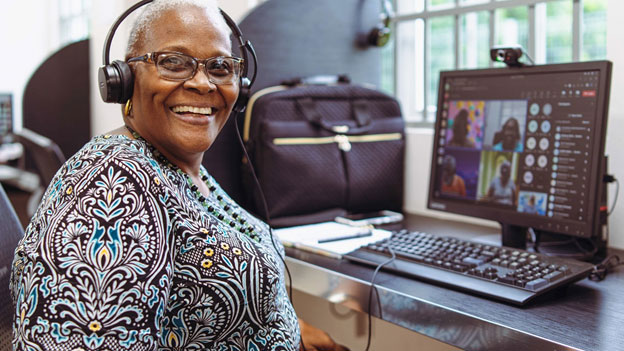Small Island Digital States: Charting the Course for Transformation

UNITED NATIONS, Feb 21 (IPS) - Small Island Developing States, or SIDS, have long been pioneers in international development, often compelled by the challenges they face. Positioned on the frontlines of climate change, they lead efforts in mitigation, adaptation, and advocacy, and despite their geographical dispersion, they are innovating approaches to resilience and sustainability.
SIDS are leveraging digital tools and technologies for real and positive impact on their countries and communities. They are leaders in internet gender parity, whilst a number perform strongly on global indices of cybersecurity. They are increasingly becoming Small Island Digital States.
This shift is reshaping the way people in SIDS live and work, facilitating connectivity, shaping new industries and opportunities, and ensuring that public services can reach even the most remote areas.
From the SIDS Global Data Hub in Antigua and Barbuda to the national digital strategies in the Cook Islands and Niue, to the Digital Pathway of Samoa, and substantial innovation efforts in countries such as Trinidad and Tobago, the Maldives, and São Tomé and Príncipe, digital is positively changing lives and livelihoods.
Advocating for transformation
A whole-of-society approach to digital transformation is needed to benefit all facets of SIDS' societies and economies. This involves placing people at the core of digital endeavours, shaping regulations to address digital harms, and fostering digital skills across society – particularly in relation to shaping future-looking skills and career foundations and pathways.
This also includes developing and retaining talent within the public sector. The collaborative efforts of government, private sector, and civil society are essential for a strategic and inclusive approach to deliver the potential of digital. A major upcoming report from UNDP – Small Island Digital States – identifies how SIDS can drive a whole-of-society approach founded on UNDP’s framework.
Through exploring the digital journeys of SIDS in this forthcoming report, it is clear that SIDS are increasingly recognizing the unique roles and strengths of each sector and ensuring that the benefits of digital reach all members of society. This includes the digital inclusion of remote and marginalized populations.
The involvement of young people, often hard to reach through traditional means, is paramount. They will be the digital leaders, innovators, and customers of the future. Recognizing this, a separate study of young people’s hopes, concerns, and aspirations will also be published soon by UNDP – leveraging a unique survey of 5,000 young people in SIDS, conducted via WhatsApp, Telegram, and Facebook Messenger.
Shaping Small Island Digital States
UNDP supports numerous SIDS on their digital transformation journeys, for example conducting comprehensive Digital Readiness Assessments in over 15 SIDS – and having positioned digital transformation as a key pillar of the UNDP ‘Rising Up for SIDS’ framework.
Our work in SIDS has reaffirmed the importance of understanding how to apply digital in the most useful way. This means we need to recognize that digital transformation is often rooted in analogue and offline foundations. Individual knowledge and skills to use technology safely and meaningfully are important.
Behavioural change is vital for sustainable digital adoption, requiring shifts in internal cultures and processes, including in leveraging approaches such as open source. Financing for digital entrepreneurs in SIDS can also not be overlooked, with local financing institutions often more familiar with tourism or real estate, and less clear about the potential of digital enterprises and entrepreneurs. And planning for the long term is imperative as the return on investment in digital is often not immediate.
SIDS governments and other innovators are building the political capital, buy-in, and momentum to deliver transformational change. Our Digital Readiness Assessments highlighted that nearly 60 percent of SIDS' populations are keen to see even bolder digital efforts from their governments.
Charting the course
UNDP’s extensive digital work across SIDS, and the findings of these two reports, highlight that despite discussions often framing SIDS in terms of vulnerability and isolation, the digital realm is proving that SIDS are not just surviving; they are thriving.
Through leadership, adaptability, and the emergence of local digital ecosystems, they are demonstrating the transformative power of digital technologies. SIDS are actively engaging in public-private partnerships, leveraging civil society, and collaborating beyond their borders to advance digital objectives collectively.
Global collaboration across the SIDS community is already driving digital best practice. Many are sharing their digital knowledge, expertise, and learning – accelerating the digital journeys of fellow countries.
This collaboration is reshaping the SIDS discourse, showcasing that these countries are actively leading in digital expertise and exploration. SIDS are agile and moving quickly. As islands, they are exciting global beacons of digital innovation and demonstration. And they are swiftly evolving into Small Island Digital States.
Marcos Neto is UN Assistant Secretary-General and Director of UNDP's Bureau for Policy and Programme Support; Robert Opp is Chief Digital Officer, UNDP.
Source: UN Development Programme
In April this year, the UNDP Global Centre for Technology, Innovation, and Sustainable Development will be launching two key reports as inputs into the discussions around the 4th International SIDS Conference. These reports will provide deeper findings and insights into how SIDS are becoming Small Island Digital States and into youth perspectives on digital technologies.
IPS UN Bureau
© Inter Press Service (2024) — All Rights Reserved. Original source: Inter Press Service

